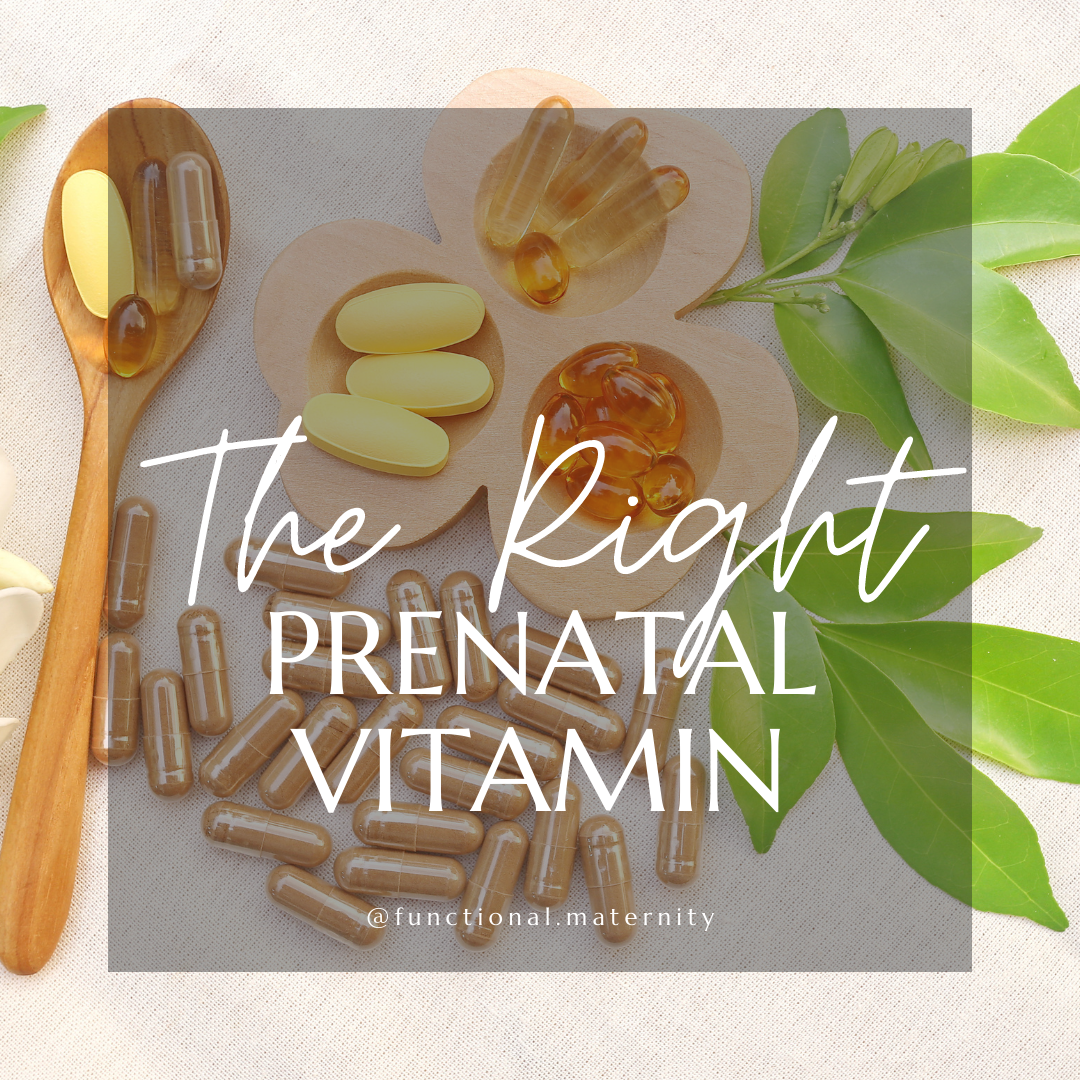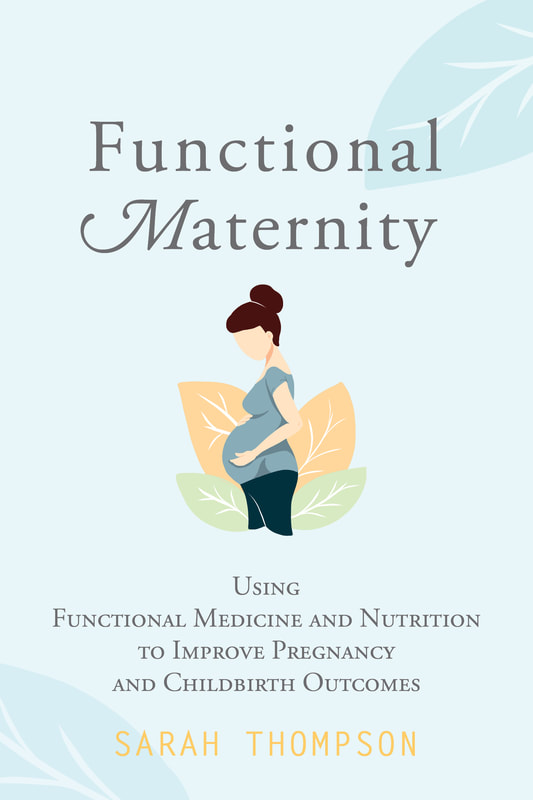Our patients come to us to help them decipher the vast array of options on the market. It is our job to make sure we are providing them with the correct information as it pertains to nutrition and their individual presentations. No two vitamin supplements are made the same, and no one vitamin provides adequate nutritional support throughout the entire pregnancy. Maternal Nutrition Crash CourseMaternal nutrition and Prenatal nutrition are two vastly different, but very connected needs. The science and research into pregnancy nutrition has been focused on the development and growth of the baby, Prenatal Nutrition. We've forgotten about the development and growth of the mother, Maternal Nutrition. Although many of the same nutrients are needed for both the mother and her fetus to thrive and function, if we solely focus on the fetal health, we miss much of what makes the mother thrive and function. Her needs are similar, but also different. This is Maternal Nutrition. I believe that if the mother is healthy the baby will be healthy. In my practice, my focus is on the fetus AND the mother. Each phase of pregnancy offers its own unique nutritional needs for both mother and baby. If these needs are not met, complications in either the baby or the mother can occur. Each phase needs specialized nutrition. THERE IS NO ONE SIZE FITS ALL PRENATAL VITAMIN. There is no single multivitamin that will fill all the needs of conception through lactation. In fact, many nutrients that are essential for conception could hinder the function of childbirth, and vice versa. To truly know what prenatal vitamin is best for your patient, you should fully understand the inner workings of BOTH prenatal and maternal nutrition on a biochemical level. During the Preconception and First Trimester much of the same nutrition is needed. The preconception phase is the most important in sustaining a healthy first trimester. Any deficiencies prior to conception will only worsen as gestation progresses. Preconception nutrition focuses on the creation of healthy sperm (yes, men need nutritional help too), and eggs. If either is weak, the risk of miscarriage and birth defects increases. Healthy embryos (from healthy eggs and sperm) carry with them most of the vitamins and minerals they will need to grow throughout the first 12 weeks of gestation. Which is why preconception nutrition is vital for a healthy first trimester. Once conception takes place, the maternal nutrition focus is on hormones, placental growth, and additional nutritional support for fetal growth. When looking at a prenatal vitamin for the preconception and first trimester some key nutrients to consider are: Beta Carotene/Vitamin A, Vitamin E, Vitamin D, B Vitamins, Choline, Selenium, Zinc, Magnesium, CoQ10 The second trimester is usually the sweet spot of pregnancy, where most women feel great. But don't let this fool you...this is a critical time for nutrient absorption and storage. At this point the placenta is well established and the mother's diet is the significant source of nutrients needed for fetal development and growth. The mother's body is also making significant changes at this point. Her blood volume needs to double in the next couple of months to accommodate the increased nutritional demands of the fetus. The amniotic fluids levels are a rich concoction of electrolytes, antioxidants, proteins, and other compounds that must be filtered and replenished multiple times per day. This is a time of anabolic nutrient absorption and storage that will quickly change in the third trimester. Key nutrients to consider in a prenatal vitamin are Beta Carotene & Retinol/Vitamin A, Vitamin D, Vitamin E, Vitamin C, B Vitamins, Iron, Iodine, Zinc, Magnesium, Potassium, Calcium, Choline, DHA The third trimester is a dramatic shift in maternal metabolism and maternal nutrition needs. Less nutritional focus is on fetal development and more on maternal health, function, and preparation for childbirth. The same prenatal that was used in conception and the first trimester isn't the best for preparing for childbirth. Beginning around week 30-34 the mother's body begins to change to a more catabolic state. Any nutritional deficiencies that were present before this time are typically extremely hard to recover from, as the mother's nutritional absorption is lower. During this phase, the fetus must accumulate large stores of nutrients prior to birth, and the mother is responsible for providing these in large quantities. The mother's body is also producing increasing amounts of hormones, neurotransmitters, and other compounds that will be necessary for childbirth to occur. Key nutrients to consider in a prenatal vitamin are Retinol/Vitamin A, Vitamin D, Vitamin K, Vitamin E, Vitamin C, B Vitamins, Iron, Iodine, Magnesium, Potassium, DHA In the last month of pregnancy, maternal nutritional needs significantly switch. From 35/36 weeks until delivery momentous changes are occurring in the mother's body. Cervical and uterine changes require their own special blend of nutrients, whose function can be inhibited by the nutrients that were necessary to maintain pregnancy from the first trimester on. The same prenatal that sufficed and improved health in the first and second trimester as well as the early third trimester, may inhibit natural labor at this phase, or cause complications. Key nutrients to consider in a prenatal vitamin are Retinol/Vitamin A, Vitamin D, Vitamin K, B Vitamins, Iron, Iodine, Magnesium, Potassium, CoQ10 Certain patients may need additional nutrient support based on past health history or preexisting diagnoses. I also did not touch on macronutrients, which are extremely important in the maternal and fetal nutrition protocols, but don't apply to our topic of prenatal vitamins. Connecting the Dots: Pregnancy Complications - Nutritional DeficiencySo, we've touched on the basics of maternal/prenatal nutrition, but this is America and nutritional deficiencies are rare, right? I am sure you have read or heard this before. Here in America, with the food fortification system, we've wiped out nutritional deficiencies. I hate bursting balloons, but this is a myth. According to the CDC the majority of American are eating a nutrient poor diet.
Based on the data collected by the CDC, the 2016 Health and Nutrition Examination Survey, Americans aren't doing so well... ...any deficiencies prior to pregnancy only worsen with the increased demand. As the American diet becomes less and less nutrient dense, the rate of preventable pregnancy and childbirth complications goes up. Gestational Hypertension, Gestational Diabetes, Postpartum Hemorrhage, and Maternal Death have all seen staggering rises in the last two decades. Women with Hypertension associated with Preeclampsia were more likely to be deficient in the following nutrients: Vitamin A, Vitamin D, Vitamin E, B Vitamins (B1, B2, B5, B6, B9, B12), Vitamin C, Magnesium, Zinc, Calcium, Potassium The increased risk of Gestational Diabetes has been associated with: Vitamin D, Vitamin C, Vitamin B6, Magnesium, Potassium, Chromium. Recognizing Nutritional DeficienciesNutritional deficiencies begin slowly. You don't just develop scurvy overnight. There are stages of deficiency, often with very slight and very dismissible symptoms. Some of which are common pregnancy complaints, such as restless leg and calf cramps, which are overlooked as normal "side effects" of pregnancy. Therefore, the dietary choices and philosophies, as well as the nutritional status leading into pregnancy is the most important part of maternal/prenatal nutrition. If a patient is entering pregnancy with a nutritional deficiency, they will have a harder time recovering from this, and will need extra, individualized support. When we recognize patterns and symptoms of deficiency, we must work backwards. If a patient is showing an issue in the first trimester, this is, most likely, due to poor nutrition prior to conception. To properly treat the patient and recommend supplementation, we must address the circumstances that led to the deficiency and the individual deficiency. If a patient is having issues in the second trimester, this may be due to poor diet during the first trimester (morning sickness). If a patient had a difficult labor due to nutritional deficiencies, this is due to poor nutrition during 2nd and 3rd trimester...so on and so forth. As healthcare practitioners, our job is to recognize these situations, and provide research-based support to improve overall health and function of the mother. Education in nutrition is the foundation of health. By understanding the functionality of individual nutrients, we are better able to provide realistic support for our patients, and in the end a more functional pregnancy and childbirth. In the end, supplements are a safety net. They are not meant to take over for the diet, and you can't expect a supplement to make up for a poor diet. RDA recommendations are the minimum at which the body needs to survive, but not necessarily thrive. In addition, each body and its individual needs are different and for some the RDA is nowhere near enough to maintain function. Addressing the diet of individuals should always come first. Copyright © 2019 Functional Maternity, All rights reserved. The content in this article is not intended to be a substitute for professional medical advice, diagnosis, or treatment. Always seek the advice of your physician or other qualified health provider with any questions you may have regarding your medical condition.
2 Comments
Alicia Gurdumov
2/10/2023 09:58:08 pm
Hi,
Reply
3/16/2023 06:58:09 am
My wife is pregnant, and we want to make sure that she's healthy. It makes sense that getting the right vitamins would be beneficial. I can see how it would be important to keep her body healthy during a pregnancy.
Reply
Leave a Reply. |
Hi There!I'm Sarah Thompson, a Certified Functional Medicine Practitioner who specializes in Maternal, Prenatal and Childbirth health. I'm also the author of Functional Maternity, and the upcoming book Beyond Results - A practitioner's Handbook to Effective Functional Lab Analysis in Pregnancy. Purchase BookArchives |





 RSS Feed
RSS Feed